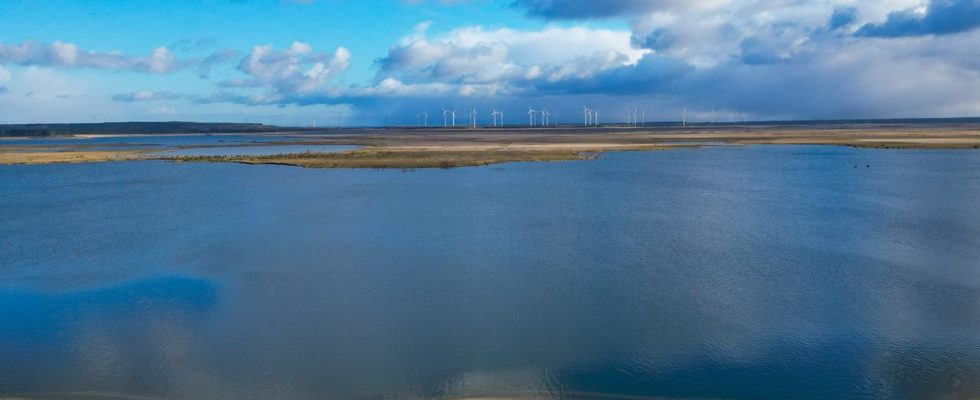background
Billions will be needed in the future to renaturate the opencast mine. The East German lignite companies are restructuring their business. But will money be there when it is needed?
2.6 billion euros: This is the amount of compensation paid by the federal government to the West German electricity company RWE, which the EU Commission approved in December 2023. After the decision, it didn’t take long for Saxony’s Prime Minister Michael Kretschmer to criticize the federal government.
The unilateral decision in favor of paying compensation for RWE is a disappointment from Saxony’s perspective. “One gets the impression that the federal government is not doing enough to support the lignite companies in East Germany, LEAG and MIBRAG.”
A criticism that Michael Kellner, State Secretary of the Green Party in the Federal Ministry of Economics, made in an interview with the in December mdr rejects: “That’s rubbish, and MP Kretschmer knows it too.” The federal government wants the aid to LEAG to flow in the same way as that to RWE.
1.75 billion euros should go to LEAG alone. The money is intended for renaturation. However, it is not clear whether the billions will actually flow. The EU Commission has doubts about the amount of compensation payments and is now checking whether – and if so, how much – money will go to the company.
A warning from the federal level
Waiter says in mdr-Conversation expressed his concerns that the funds for the recultivation of the opencast mines would not be there when they were needed. When the Swedish state-owned company Vattenfall sold its East German coal business and thus LEAG and MIBRAG to the current owner EPH, the states demanded too few security deposits.
“That worries me because I don’t want the taxpayer to end up being the stupid one,” said Kellner. According to mining law, coal companies are responsible for the recultivation of opencast mines.
Kellner is therefore of the opinion that the coal-fired countries must now make intensive efforts to find reserves for renaturation: “Of course there is always the risk that things will go wrong. That the coal-fired power plants will be closed, driven by the market, and the countries will be left with it.”
A warning that some recipients apparently take seriously: “Securing the recultivation costs is an absolute priority for the state of Brandenburg,” wrote Hendrik Fischer, State Secretary in the Brandenburg Ministry of Economic Affairs, to the coal company LEAG in late summer.
Coal business as a “remainder ramp”?
LEAG is one of Germany’s largest electricity suppliers and operates open-cast brown coal mining and coal-fired power plants in Lusatia in Brandenburg and Saxony. The coal giant is currently investing a lot of money in renewable energies and is planning gigantic wind and solar parks that should continue to generate profits in the future. The coal, however, will be spun off into an operationally independent company under the umbrella of LEAG Holding.
LEAG thus acts in a similar way to its parent company, the Czech EPH Group. It has also begun to outsource its East German coal business. LEAG is already part of the new “EP Energy Transition”. By 2025, MIBRAG, which operates opencast mining in Saxony and Saxony-Anhalt, should also be incorporated into this.
Are “bad banks” – i.e. liquidation institutions – being founded here? This is what environmental groups like BUND and green politicians fear. They believe that the coal division should be specifically sent into bankruptcy – a move to avoid having to pay the costs of renaturation. The coal business becomes increasingly unprofitable the more the EU demands for climate-damaging exhaust gases.
Benjamin Raschke, a Green member of the state parliament from Brandenburg, sees “a serious danger that the public sector will ultimately have to pay for the damage caused by lignite mining.”
LEAG rejects this. In a statement, it explains that the restructuring is important for its realignment – for “the financing ability of the green business areas”. This also includes a commitment to the company’s long-standing commitments to making the opencast mining areas usable again.
Fresh money for “green” technologies
Anyone who wants to make a coal company climate neutral needs fresh money. Investors no longer like to invest their assets in depreciated fuel. The spin-off therefore seems plausible. According to the motto: Get rid of the coal division and move on to the future.
But could the Czech EPH Group also avoid its responsibility for renaturation if its sister company goes bankrupt? Brandenburg State Secretary Fischer obviously has this concern. In his letter to the coal company, he further writes that even in the event of a restructuring process at LEAG, it must be ensured that the specified payments can be made securely. It should always be ensured that there is enough money for renaturation.
Fischer is even threatening the company to check whether security payments need to be provided: guarantees that cover the difference between the existing reserves and what will ultimately be necessary for the renaturation.
Brandenburg has company information checked
Upon request of the mdr The Brandenburg Ministry of Economic Affairs confirms that the company has provided all the information about how the renaturation should be securely financed. These are currently being checked by a specialist lawyer. “The result of the test is not yet available,” said a spokeswoman.
There is no reason for unrest in Saxony. The Ministry of Economics in Dresden says that the Free State has concluded a precautionary agreement to secure the renaturation costs: “To date, LEAG has completely fulfilled all of its obligations under the precautionary agreement, and we assume that this will continue to happen in the future. Both the Free State of Saxony and the State of Brandenburg agree that EPH’s business decision to restructure LEAG must not have any negative effects on this pension agreement.”
A spokesman tells us that we are in consultation with the state of Brandenburg mdr with.

